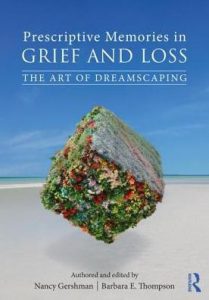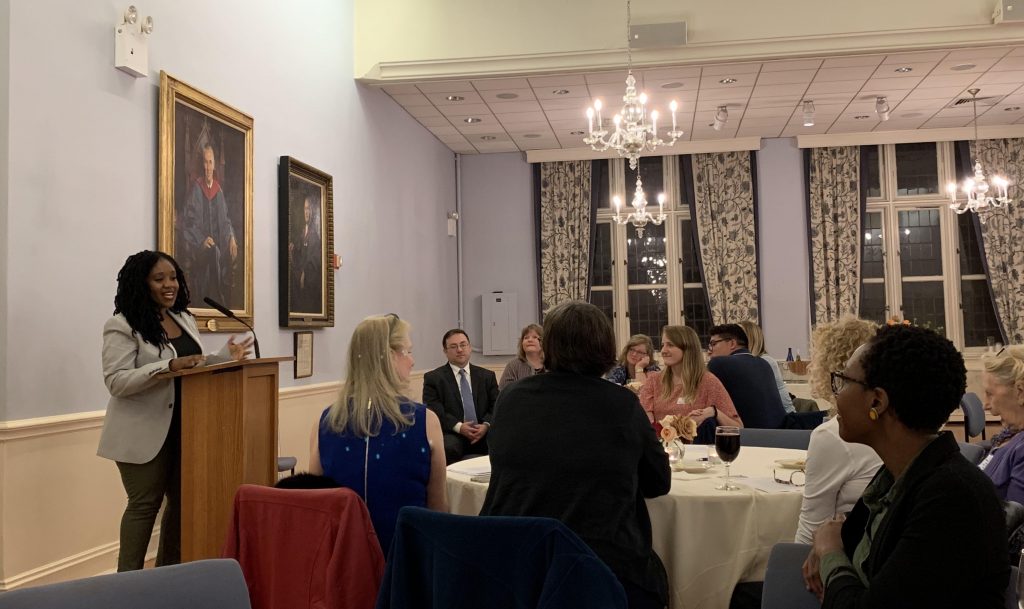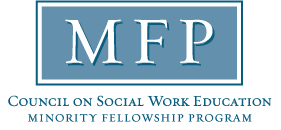Tell us about how your experience led you to your interests in dreamscaping and social work?
Social work has been my life’s calling, only I didn’t know it until I met Maureen, a social worker with three decades of experience in hospice and palliative care. It was while volunteering at a 25-bed hospice run by Visiting Nurse Service of NY that Maureen taught me how to take the temperature of the room to gauge whether a patient wants to share their emotional truth privately or within the family group.
 It was also in this New York City hospice where I did my first clinical work as a memory artist and bereavement volunteer. My work with hundreds of end-of-life patients and their families became the basis for my book, “Prescriptive Memories in Grief and Loss: The Art of Dreamscaping” (Routledge, 2019), co-authored with psychotherapist Barbara E. Thompson.
It was also in this New York City hospice where I did my first clinical work as a memory artist and bereavement volunteer. My work with hundreds of end-of-life patients and their families became the basis for my book, “Prescriptive Memories in Grief and Loss: The Art of Dreamscaping” (Routledge, 2019), co-authored with psychotherapist Barbara E. Thompson.
What is dreamscaping?
Dreamscaping is a breakthrough intervention that is rooted in how the emotional brain encodes new memories. Imagine one organizing principle—”bring me your favorite or good-enough memory” fulfilling an intention, wish, dream or longing.
Here’s a story from the book to give you an idea:
Jane is a photographer, unable to work after the death of her mother, with whom she was very close. As I got Jane to focus on fun memories of Sylvia, she began to remember how much the two of them loved Christmas, despite being “atheist and Jewish.” During our exchange, I heard that rare bird of a memory that suddenly got Jane laughing. She recalled that as Sylvia lay dying in hospice on Christmas Day, she had this fleeting fantasy of Santa coming back for Sylvia so they could go off together on his sled. Before dreamscaping, Jane had never breathed a word of this to anyone, and yet here was a perfect example of a hidden resource that translated beautifully into a prescriptive memory, making it more available for use in coping with the loss of her mother. Later, when we constructed it as a tangible dreamscape, Jane was able to change her perception of a white marble sculpture by Sylvia (who was a sculptor) that seemed to be waving goodbye to one that was now waving hello. In Jane’s words, “…my feelings changed,” and dreamscaping “showed me you can make yourself believe different things.” (From Chapter 3, “Elicitation of Humor, Positive Emotion and Play in Dreamscaping.”)
What was your inspiration for writing this book?
I wrote this book knowing there was a community of learners out there, a wide range of therapists, end of life practitioners, and even spiritual care counselors drawn to short-term, novel, strengths-based interventions. These included art therapists who longed to work more collaboratively with clients and clinicians who wished to investigate what happens when you invite a memory artist into the therapeutic dyad.
My goal in pursuing my MSW in Advanced Clinical Practice at a prestigious university like Columbia University was to be able to teach and practice dreamscaping, globally, and on a deeper level.
It sounds like you’ve already made a significant impact in the field. In what ways has your experience here at CSSW impacted you?
In my first year of field at FDNY Counseling Service Unit, I was dropped into group work with firefighters and EMTs —journaling, anger management, relapse prevention. Some days there would be up to 20 men and women around the table. I had stage fright at first until I learned that the “group does the group’s work.” In the same way that social workers learn not to fix people, I learned how to let things roll, intervening only when I felt a pearl had dropped and not marking that moment would be a lost opportunity.
As someone who entered the program with prior professional experience, what insights or advice would you like to share with other students?
Success can mean many things, but for me it was the opportunity to be taken seriously by my peers who were credentialed and spoke the identical language of advanced clinical practice. And if you have to do your life backwards as I have—proposing a job description to a Director of Bereavement Services that no one had ever heard of (“memory artist”), getting bereavement volunteer training at that hospice before being assigned to a floor, authoring a book based on clinical experiences with end-of-life patients and their families on that floor, going to graduate school, and requesting field placement with a population I never worked with before—DO IT. You can never be too young or too old to venture into the brilliant unknown and test yourself.
 We are so grateful and fortunate to have had the opportunity to have Pam Picon ’20 work with our team over the last two years in career services!
We are so grateful and fortunate to have had the opportunity to have Pam Picon ’20 work with our team over the last two years in career services!




 Born and half-raised in Taiwan, Christine Chang ’19 has lived and studied in the United States, Hong Kong, and Germany. Before pursuing her MSW degree at Columbia, Christine founded a program which focuses on fostering cultural understanding between refugees and their respected local communities. Her background includes working with Syrian refugees in Germany and asylum seekers in Hong Kong, which inspired her to pursue a career in humanitarian affairs.
Born and half-raised in Taiwan, Christine Chang ’19 has lived and studied in the United States, Hong Kong, and Germany. Before pursuing her MSW degree at Columbia, Christine founded a program which focuses on fostering cultural understanding between refugees and their respected local communities. Her background includes working with Syrian refugees in Germany and asylum seekers in Hong Kong, which inspired her to pursue a career in humanitarian affairs.
